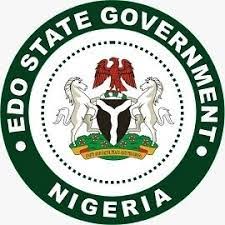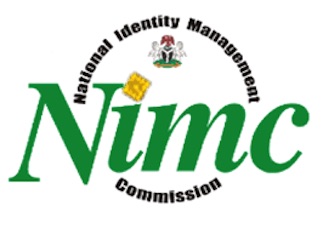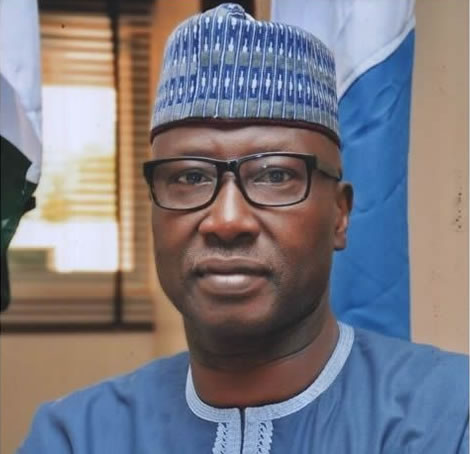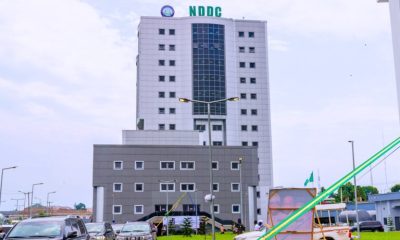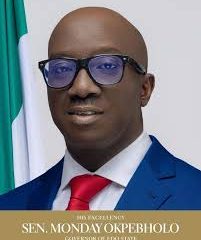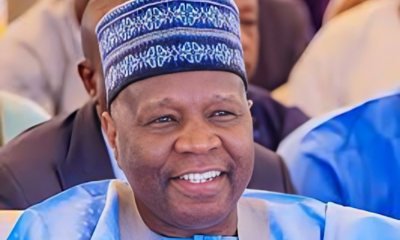POLITICS
Buhari Re-awakens Nigerians on Gas Potential

President Muhammadu Buhari re-awakened Nigerians on the huge potential of exploiting gas resources to turn around Nigeria’s economy in a week he departed Abuja for London for his routine medical checkup.
Buhari, looking smart in his trademark caftan and a cap to match, bid an emotional farewell to his countrymen before leaving the Nnamdi Azikiwe International Airport, Abuja for London.
He is expected back in about a fortnight.
Buhari had earlier on March 29, participated virtually in the 2021 Nigeria International Petroleum Summit Pre-Summit Conference and official launch of the Decade of Gas.
The president re-assured that his administration would utilise the huge gas resources in Nigeria to uplift the country’s economy and drive industrialisation in Africa’s most populous nation.
The oil-rich Nigeria, which is also Africa’s top economy has one of the largest gas reserves in the world.
Buhari said that given Nigeria’s reserve of about 600 trillion cubic feet of gas, the commodity had enormous potential to diversify Nigeria’s economy.
‘‘The rising global demand for cleaner energy sources has offered Nigeria an opportunity to exploit gas resources for the good of the country.
“We intend to seize this opportunity,’’ he stated.
The president also told participants at the conference that his administration had prioritised gas development and recorded remarkable progress.
“It is well known that Nigeria is a gas nation with a little oil but the country has focused on oil over the years.’’
‘‘That is the paradox which this administration decided to confront when we declared the year 2020 as “The Year of Gas” in Nigeria.
‘‘Our major objective for the gas sector is to transform Nigeria into an industrialised nation with gas playing a major role.
‘‘We also kick-started other policies and projects like the National Gas Expansion Programme, Autogas Policy and the construction of the 614 km Ajaokuta-Kaduna-Kano Gas Pipeline Project,’’ he said.
Also on March 29, Buhari counselled that Nigerians were better together, in spite of intermittent inter-ethnic tensions in the country.
He also spoke virtually during the 12th Asiwaju Bola Tinubu Colloquium, held in Kano.
“Despite occasional inter-ethnic tensions in our national history, it seems to me that we have all agreed on one point that notwithstanding our diversity of ethnicity, culture, language and religion, Nigerians are better together; even stronger together.’
“We all have a stake in the Nigeria project and while playing our respective parts in its unity, peace and progress, we must constantly keep faith with the promise of a greater Nigeria.’’
On March 29, Buhari met behind closed doors with the Chairman, Nigerian Governors Forum and Governor of Ekiti, Dr Kayode Fayemi, where issues of security dominated their discussion.
Fayemi, while addressing State House Correspondents shortly after the meeting, commended the Buhari administration for securing funds to purchase weapons for security agencies to end insurgency and criminal activities.
According to him, the security agencies are being equipped with modern gadgets and weapons to enable them to provide adequate security for citizens, including farmers, to avoid food crisis in the country.
On March 30, the president also met behind closed doors with the leadership of the National Assembly, including Senate President Ahmed Lawan and House Speaker Femi Gbajabiamila over supplementary budget for security and COVID-19.
Speaking to reporters at the end of the meeting, Lawan said that they deliberated on crucial national issues with the president.
Also on March 30, Buhari ordered security forces to identify and crush bandits, kidnappers and their collaborators to restore confidence in society.
The president gave the order when he met security chiefs shortly before he travelled out of the country for his medical checkup.
The president’s spokesman, Mr Femi Adesina, said in a statement that that the president “is due back in Nigeria in the second week of April, 2021.”
On March 31, Vice-President Yemi Osinbajo on his part, presided over a virtual meeting of the Federal Executive Council (FEC) at the State House.
A minute silence was observed in honour of two former ministers, Sen. Bode Olowoporoku and Alhaji Umaru Baba.
Baba, 81, died on March 26.
Olowoporoku, who was a one-time Minister of Science and Technology while Baba was at different times, Minister of State for Petroleum Resources and Minister of State for Defence.
He died on March 24 at 76, having served as Senator, representing Ekiti South Senatorial District at the Senate and also as Minister of Science and Technology in the Second Republic.
The virtual FEC meeting had the Chief of Staff to the President, Prof. Ibrahim Gambari and the National Security Adviser, retired Maj.-Gen. Babagana Monguno and seven ministers in attendance.
Also while in London on March 31, Buhari made a telephone call to the out-going leader of Niger Republic, Mahamadou Issoufou, where the Nigerian leader condemned the attempted coup in Niger Republic.
According to a presidential statement, Buhari was quoted as saying that “any illegal effort to depose a democratically elected government is not only despicable but unacceptable to democratic governments around the world.”
On March 31, Osinbajo presided over a tripartite committee meeting, comprising the executive, legislative and leadership of the APC party at the State House.
Those in attendance were Lawan, Deputy Senate President, Ovie Omo-Agege and Secretary to the Government of the Federation, Boss Mustapha.
On April 1, the Presidential Communication Media Team, organised a media briefing with the Minister of Communications and Digital Economy, Dr Isa Pantami as resource person.
At the briefing, Pantami announced that the Federal Government had so far enrolled 51million citizens in the National Identification Number scheme as at March 31.
He also revealed that 189 million subscribers of the Identification Module had been registered nationwide.
According to the minister, only 150 million out of the 189 million have successfully completed their registration while the remaining have had problems of improper registration.
Also on April 1, Buhari rejoiced with Christians on the occasion of this year’s Easter celebration.
He recalled that “in most of our major cities, our celebrations were subdued as Nigeria battled the effects of the deadly coronavirus pandemic a year ago’’.
The president has also condoled with the family, friends and acquaintances of Mr Yinka Odumakin, Spokesman of the Yoruba socio-political group, Afenifere on the passing of the activist.
NAN reports that Odumakin was Buhari’s spokesman when Buhari ran for president on the platform of the defunct Congress for Progressive Change.
The president described Odumakin as dutiful and a man of conviction.
He expressed sorrow at Odumakin’s demise, especially at a time when he had a lot more to contribute to the society and the nation at large.
On April 3, Buhari condemned the attack in three communities in the Íshíelu Local Government Area of Ebonyi. The attack in which 22 people were reportedly killed took place in Egedege, Obegu and Amuzu communities.
While directing law enforcement agencies to fish out the attackers and make them face justice, Buhari stressed that the perpetrators of the “heinous attack” would not be spared.
He extended his deepest sympathies to families and friends who had lost loved ones during the attack and to every member of the communities.
Similarly, the president also sent a message of sympathy to a former Governor of the Central Bank of Nigeria and a member of the Presidential Economic Advisory Council, Prof. Chukwuma Soludo, who survived an attack by gunmen in his town in Aguata in Anambra.
Soludo was at a political meeting on his bid to contest for governorship in the upcoming elections in Anambra, slated for Nov. 6. (NAN)
FEATURES
We Have Made Undeniable Progress: President Bola Tinubu’s Second Anniversary Speech
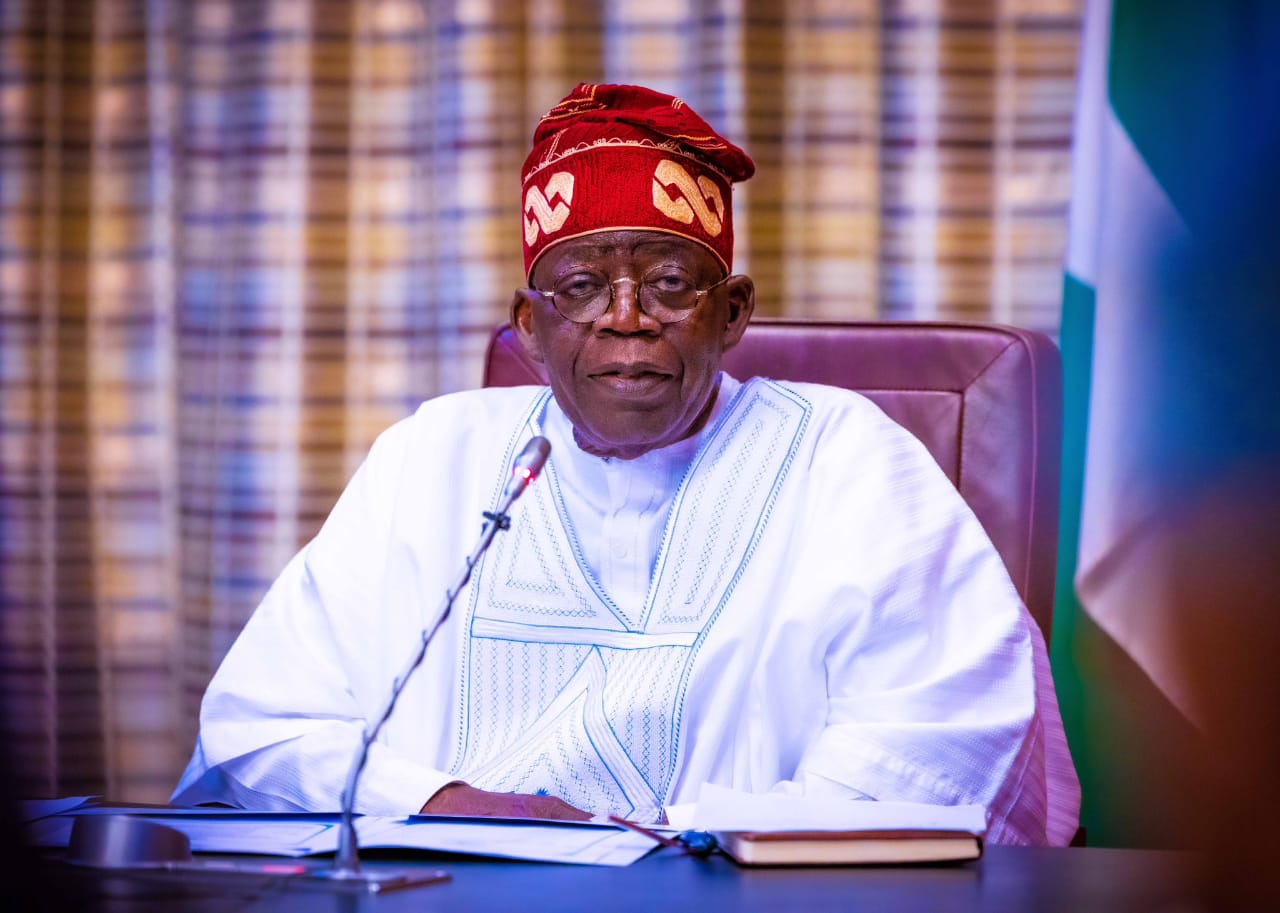
Fellow Nigerians, as we mark the second anniversary of our administration, I salute your resilience and undaunted spirit. Two years ago, you entrusted me with the sacred responsibility to lead our nation at a time of historic challenges. Together, we have faced these headwinds with courage and determination.
The economic and general situation of the country I inherited required that we redirect the country’s affairs with a bold and new vision.
I immediately implemented two necessary policies to stop our country from further drifting into the precipice. It was apparent that if the federal government and the other two tiers of government must remain viable and cater to the citizens’ welfare, we must do away with decades-long fuel subsidies and the corruption-ridden multiple foreign exchange windows. The two were no longer sustainable and have become a chokehold on our nation’s neck, strangling our nation’s future.While our administration has implemented the reforms to restore and reinvigorate our national economy and strengthen our social fabric as a strong and united country, I must thank my fellow citizens for your unrelenting support and belief in the grand vision we share to uplift our nation and renew our collective hopes and aspirations.
We are halfway through the journey that began 24 months ago. Today, May 29, 2025, offers our administration the opportunity to share again how far we have gone and our progress in steering our country along the critical path of socio-economic development.
When we embarked on this journey, propelled by a burst of hope and abiding faith in Nigeria’s unity and progress, I made a pledge before God and fellow countrymen and women to confront Nigeria’s challenges head-on by rebuilding trust, fostering prosperity, and restoring our nation’s economic health. Today, I proudly affirm that our economic reforms are working. We are on course to building a greater, more economically stable nation.
Under our Renewed Hope Agenda, our administration pledged to tackle economic instability, improve security nationwide, reduce corruption, reform governance, and lift our people out of poverty.
While implementing the reforms necessary to strengthen our economy and deliver shared prosperity, we have remained honest by acknowledging some of the difficulties experienced by our compatriots and families. We do not take your patience for granted. I must restate that the only alternative to the reforms our administration initiated was a fiscal crisis that would have bred runaway inflation, external debt default, crippling fuel shortages, a plunging Naira, and an economy in a free-fall.
Despite the bump in the cost of living, we have made undeniable progress.
Inflation has begun to ease, with rice prices and other staples declining. The oil and gas sector is recovering; rig counts are up by over 400% in 2025 compared to 2021, and over $8 billion in new investments have been committed. We have stabilised our economy and are now better positioned for growth and prepared to withstand global shocks.
In 2025, we remain on track with our fiscal targets. Gross proceeds per barrel from crude oil are broadly aligned with our forecasts as we intensify our efforts to ramp up production. Our fiscal deficit has narrowed sharply from 5.4% of GDP in 2023 to 3.0% in 2024. We achieved this through improved revenue generation and greater transparency in government finances. In the first quarter of this year, we recorded over N6 trillion in revenue.
We have discontinued Ways & Means financing, which has been a major contributor to high and sticky inflation. The NNPC, no longer burdened by unsustainable fuel subsidies, is now a net contributor to the Federation Account. We are also achieving fuel supply security through local refining.
Our debt position is improving. While foreign exchange revaluation pushed our debt-to-GDP ratio to around 53%, our debt service-to-revenue ratio dropped from nearly 100% in 2022 to under 40% by 2024. We paid off our IMF obligations and grew our net external reserves by almost 500% from $4 billion in 2023 to over $23 billion by the end of 2024.
Thanks to our reforms, state revenue increased by over N6 trillion in 2024, ensuring that subnational governments can reduce their debt burden, meet salaries and pension obligations on a timely basis, and invest more in critical infrastructure and human capital development.
One of our administration’s most impactful achievements is our bold tax reform agenda, which is already yielding results. By the end of 2024, our tax-to-GDP ratio rose from 10% to over 13.5%, a remarkable leap in just one year. This was not by accident. It results from deliberate improvement in our tax administration and policies designed to make our tax system fairer, more efficient, and more growth-oriented.
We are eliminating the burden of multiple taxation, making it easier for small businesses to grow and join the formal economy. The tax reforms will protect low-income households and support workers by expanding their disposable income. Essential goods and services such as food, education, and healthcare will now attract 0% VAT. Rent, public transportation, and renewable energy will be fully exempted from VAT to reduce household costs further.
We are ending the era of wasteful and opaque tax waivers. Instead, we have introduced targeted and transparent incentives supporting high-impact manufacturing, technology, and agriculture sectors. These reforms are not just about revenue but about stimulating inclusive economic growth.
There is a deliberate focus on our youth, who a friendlier tax environment for digital jobs and remote work will empower. Through export incentives, Nigerian businesses will be able to compete globally. Our National Single Window project streamlines international trade, reduces delays, and enhances Nigeria’s competitiveness.
To promote fairness and accountability, we are establishing a Tax Ombudsman, an independent institution that will protect vulnerable taxpayers and ensure the system works for everyone, especially small businesses.
Most importantly, we are laying the foundation for a more sustainable future by introducing a new national fiscal policy. This strategic framework will guide our approach to fair taxation, responsible borrowing, and disciplined spending.
These reforms are designed to reduce the cost of living, promote economic justice, and build a business-friendly economy that attracts investment and supports every Nigerian. Together, we are creating a system where prosperity is shared, and no one is left behind.
We have breathed new life into the Solid Minerals sector as part of our efforts to diversify the economy. Revenue has increased phenomenally, and investors are setting up processing plants as the sector dumps the old pit-to-port policy and embraces a new value-added policy.
We have also repositioned our health sector despite all odds.
Over 1,000 Primary Health Centres are being revitalised nationwide. An additional 5,500 PHCs are being upgraded under our Renewed Hope Health Agenda. We are establishing Six new cancer treatment centres. Three are ready. We offer free dialysis services in pilot tertiary hospitals and subsidise the service in others. Under the Presidential Maternal Health Initiative, over 4,000 women have undergone free cesarean sections. Lastly, we have expanded Health Insurance Coverage from 16 million to 20 million within two years.
As a result of our bold and deliberate policies, the economy is growing stronger again. Real GDP rose by 4.6% in Q4 2024, with full-year growth of 3.4%. This is one of the strongest in a decade.
Without a responsive and reliable national security infrastructure that can protect lives and properties, our economy will not perform optimally, and those who seek to harm us will impair and disrupt our way of life. Our administration is committed to the security and safety of our people. For our government, protecting our people and their peaceful way of life is the utmost priority.
Since I assumed our country’s leadership, our administration has improved collaboration among security agencies, increased intelligence-driven operations, and better ensured the welfare of our armed forces and security personnel. I use this opportunity to salute the courage and everyday sacrifice of our service men and women. We may not always witness the tremendous efforts they make to keep us safe, but we benefit every day from the results of their dedication. Even if we do not thank them often enough, they willingly face danger so we can go about our lives freely and without fear.
Our military, police, and intelligence agencies are committed to always responding to emerging security threats and new challenges because it is the patriotic duty they owe a grateful nation.
Amid the new security challenges, we can report some successes. In some areas of the northwest, hitherto under the control of bandits, our gallant armed forces have restored order, reducing and eliminating threats to lives and livelihoods. With the success achieved, farmers are back tilling the land to feed us. Highways, hitherto dangerous for travellers, have become safer. Our security agencies have succeeded many times in rescuing the abducted citizens from the hands of their tormentors. I promise you, we shall remain vigilant, as I told security chiefs during the last meeting to up their game and collaborate to end this plague of evil men. Every Nigerian deserves to live without fear.
Outside of Security, we have prioritised human capital development as a central pillar of our national development strategy.
To this end, we have significantly expanded access to quality education through infrastructure investments and the student loan scheme to support indigent students in tertiary institutions. Through the Renewed Hope Health initiative, our administration has begun equipping health facilities and deploying skilled personnel to unserved areas. We are also strengthening our response to public health threats and implementing targeted social investment schemes.
Our youth empowerment initiatives include access to funds, skill development, and creating employment opportunities. Through our MSME support, we empower the next generation and bridge inequality. In our mission to empower the next generation, we have taken bold steps to place young Nigerians at the heart of national development. Nowhere is this more evident than at the National Agency for Science and Engineering Infrastructure (NASENI), where the current management is making giant strides. NASENI has embraced a digital-first approach, introduced real-time dashboards, and implemented end-to-end e-procurement through its Unified ERP System—setting a new governance benchmark for public institutions.
Through bold, high-impact programmes like Innovate Naija, Irrigate Nigeria, the Asset Restoration Programme, and the Renewable Energy and Innovation Park in Gora, NASENI drives inclusive industrialisation at scale. From assembling electric vehicles and reviving idle assets to launching Africa’s most advanced Rapid Diagnostic Kit Factory and training female drone engineers through the NASCAV programme, these initiatives are creating jobs, restoring dignity to work, and opening up a future of possibilities for our youth. This is the movement we promised—a government of action powered by the energy and innovation of young Nigerians.
Agriculture and food security are top priorities of our Renewed Hope Agenda. We have launched aggressive initiatives to boost local food production, support farmers, and stabilise food prices. We have also invested in mechanised farming by procuring thousands of tractors, other farming tools, and fertilisers.
Under the Renewed Hope Agenda, the federal government has continued with major road construction and rehabilitation projects across all geopolitical zones, from the Abuja-Kaduna-Zaria-Kano Dual Carriageway, the 9th Mile-Oturkpo-Makurdi Road, the Lagos-Calabar Coastal Highway, Abuja-Lokoja-Benin Road, Enugu-Onitsha Expressway, Oyo-OgbomosoRoad, Sokoto-Badagry Road, Enugu-Port Harcourt Expressway, Second Niger Bridge Access Road to Bodo-Bonny Road among hundreds of ongoing road projects across the country.
We have launched initiatives to improve electricity generation by upgrading generation and transmission infrastructure and investing in off-grid solar energy to power our homes, business premises, industries, schools and hospitals.
In the spirit of democracy and national renewal, we are preparing to welcome the world to Nigeria soon for the Motherland Festival. This landmark gathering will spotlight our rich heritage, dynamic creative industries, and the vibrant energy of our people. It will showcase Nigeria’s beauty through tourism, culture, and innovation, inviting the world to rediscover our nation.
The Nigerian diaspora plays a vital role in our national transformation. Their expertise, investment, and global perspective are key to shaping the future we seek. In recognition, the government has introduced policies like the diaspora bond and the non-resident Bank Verification Number to make it easier for Nigerians abroad to invest, engage, and contribute meaningfully to the country’s progress.
The Motherland Festival will bring together voices from across the continent and the diaspora in a decisive moment of unity and purpose, affirming that Nigeria is not only a leader in Africa but a committed global partner ready to engage, inspire, and lead.
Once again, I acknowledge the sacrifices many Nigerians have made and continue to make as we reposition our country, not just for today but for generations yet unborn. Our journey is not over, but our direction is clear. So is our resolve to tackle emerging challenges. By the Grace of God, we are confident that the worst is behind us. The real impact of our governance objectives is beginning to take hold. The future is bright, and together, we will build a stronger, more inclusive Nigeria that we can all be proud of.
Thank you all, and May God continue to bless the Federal Republic of Nigeria.
PRESIDENT BOLA AHMED TINUBU,
ASO ROCK, ABUJA
29/5/2025
POLITICS
Buhari Felicitates Tinubu at Midterm, Calls for Nigerians’ continue support

Former President Muhammadu Buhari has congratulated his successor, President Bola Tinubu, on his midterm, calling for Nigerians’ continue support for his administration’s efforts to address poverty and inflation.
This is contained in a statement issued by Buhari’s former Senior Special Assistant on Media and Publicity, Garba Shehu, on Wednesday.
Buhari also called for steadfast support for the All Progressives Congress-led government as it marks its second year in office, saying reforms would achieve success gradually, not overnight.
He warned that necessary reforms and desired changes must not fall victim to mettlesome domestic politics.
According to him, as the party and the government celebrate, the country should be reminded that leadership is a continuous journey.
Buhari expressed support for the ongoing efforts by the Tinubu-led administration to curb poverty and inflation, which, he said, had hit the poorest families.
Seeking Nigerians’ support for Tinubu-led administration, he said that the task of reducing poverty and inflation mustn’t be left only for the government.
“The private sector and all of us, as citizens, must join in all ways we can,” he said.
The former president urged Nigerians to remain optimistic and stay confident about the country’s future, saying ‘our expectations from our governments should not get heavy’.
While expressing his heartfelt felicitation to Tinubu on his two years in office, Buhari prayed God to keep and grant him the wisdom and care to continue to lead the country. (NAN)
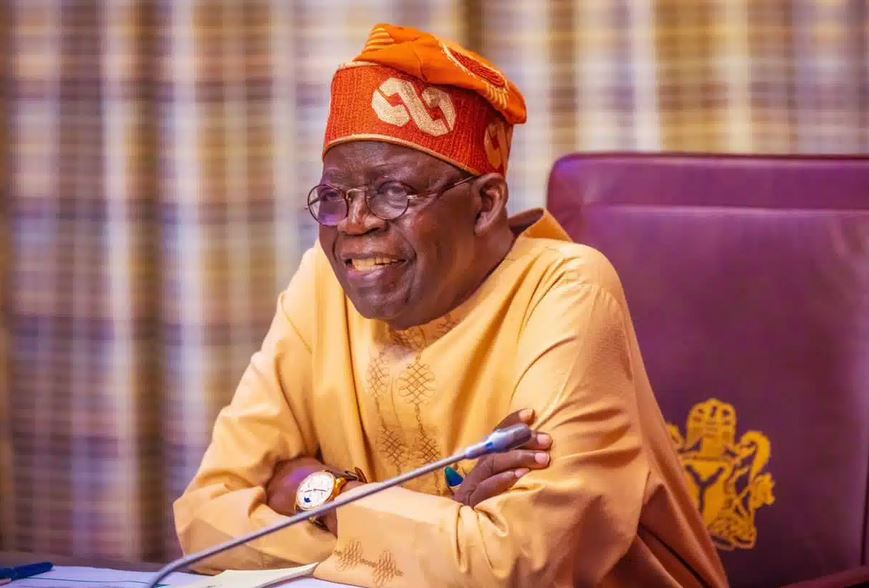
President Tinubu Appoints Ex- Speaker, Enugu Assembly, Odo, as UNN Governing Council Member
President Bola Tinubu has appointed the former speaker of the Enugu State House of Assembly, Chief Eugene Odo, and Mr. Muhammad Tahir, as governing council members of the University of Nigeria, Nsukka (UNN).
The appointment comes as part of the President’s renewed efforts to reposition federal tertiary institutions for excellence and global competitiveness.
Odo served as a two time speaker of Enugu State House of Assembly between 2007 and 2015.
The All Progressives Congress (APC) Chieftain also served under the previous administration of Muhammad Buhari as a governing board member of the Obafemi Awolowo University, Ile Ife.
Also appointed were the governing councils members of the University of Abuja (UNIABUJA) and Nnamdi Azikiwe University (NAU), Awka.
The appointments were contained in a statement issued on Tuesday by the presidential spokesman, Bayo Onanuga, in Abuja.
Onanuga said President Tinubu charged the new council members to justify their appointments by ensuring that their respective universities move forward.(NAN)

